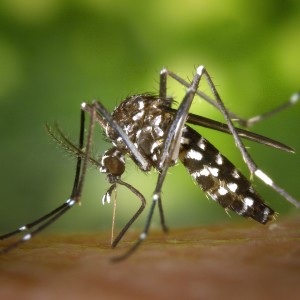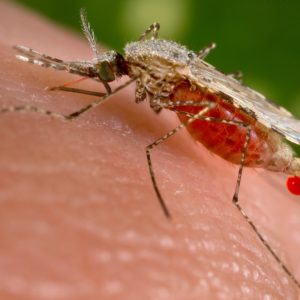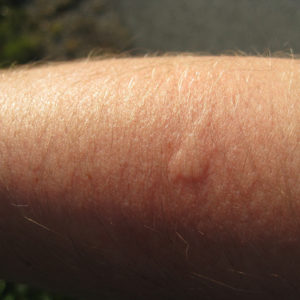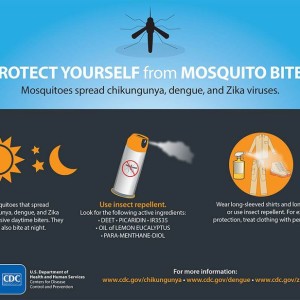Uncategorized

November 4, 2016. Allergy Testing for Asthma?
Media Inquiries: Please email gwoodlyn@asthmacenter.com
American Academy of Pediatrics Recommends Allergy Testing & Environmental Controls for Kids with Asthma
For the first time in its 86 year history, the American Academy of Pediatrics recently recommended using allergy testing for kids with asthma. Standard practice for the allergists and asthma doctors at The Asthma Center, this report raises awareness among pediatricians and parents for the need for allergy testing by board-certified allergists to improve the treatment and management of asthma. The report also recommended creating personalized care plans for children with asthma, including environmental history – the indoor and outdoor environments – where kids live, learn, and play.
Why this Clinical Report Matters
- Founded in 1930, the American Academy of Pediatrics (AAP) is the premier professional association of pediatricians in the United States (US). Currently more than 66,000 pediatricians in the US belong to the AAP and are “committed to the optimal physical, mental, and social health and well-being for all infants, children, adolescents, and young adults.”
-
Since 2009, the AAP has worked to raise awareness, provide guidelines, training and support regarding asthma care for children.
-
The AAP states that the goal of this new report is to raise awareness among pediatricians as well as parents and provide guidance regarding the need for allergy testing and environmental controls to improve the treatment and management of asthma.
-
As many as 10% of children across the US have asthma which makes “asthma one of the most common chronic childhood illnesses.” The incidence in urban environments, like Philadelphia, is even higher and can approach 25%.
What Parents Need to Know: 4 Recommendations From the American Academy of Pediatrics
- Personalized, Tailored Care:
The AAP emphasizes throughout this clinical report the importance of “individualized,” “personalized,” and “tailored” care strategies in the treatment of asthma. At The Asthma Center, this has been our standard of care for more than 25 years. Our goal is to personalize your treatment because we know that no two allergy & asthma sufferers are alike!
- An Environmental History:
The AAP advises all pediatricians that developing a personalized care plan for children with asthma must include an environmental history. Research has documented key indoor triggers of asthma symptoms and flares, and an environmental history is critical to identifying the environmental exposures which may be present in your home, in your child’s school or daycare, or in any other indoor environment your child frequents.
At The Asthma Center, an environmental history is an essential part of the evaluation we provide! Because we understand the role of indoor environmental exposures in both triggering both allergies and asthma, and the vital information an environmental history contributes to individualized care, our board certified allergists and staff have developed and utilize an in-depth environmental history survey for all our patients.
The Asthma Center’s full scale environmental history goes beyond the standard questions of if there are pets or smokers in the home. Our environmental history covers all the topics the AAP recommends (such as sources of known indoor air pollution and the use of gas stoves and appliances), and takes it even a step further to include all the indoor and outdoor exposures our board certified allergists have found to be relevant to the Delaware Valley. Since we are the Delaware Valley’s only board certified allergists studying the air quality for pollen and mold spores, (see How we count pollen and mold spores?) we know exactly what potential allergens your child may be exposed to in the outside environment. Our comprehensive environmental history is performed at each new patient visit and as part of our individualized follow up care, we are always monitoring for new, relevant changes in the environment!
-
Allergy Testing:
For children with persistent asthma, the AAP now recommends pediatricians refer children to a board certified allergist for allergy skin testing or perform serum IgE antibody tests to determine allergic sensitivity to indoor allergens. No child is too young for allergy testing.
At The Asthma Center, our board certified allergists use the results of such testing in combination with our full scale environmental history survey, history of symptoms, physical exam, and in some cases, other testing specific to a child’s experience, to create a tailored Allergy & Asthma Action plan for each child.
Special Note for Parents regarding Allergy Skin Testing: At The Asthma Center, for infants and very young children, a multi-test device is used instead of instead of individual testing which is exceedingly fast to apply and minimizes the testing time for the child.
-
Environmental Control Plan:
The AAP advises pediatricians and parents that “individually tailored environmental control measures have been shown to reduce asthma symptoms and exacerbations…” The AAP maintains such a personalized plan must be informed by a child’s environmental history and assessment of allergic sensitivity (allergy skin testing.)
At The Asthma Center, environmental control measures are part of every individuals Allergy and/or Asthma Action plan.
Special Note for Parents regarding Indoor Pollutants: The AAP clinical report pays special attention to exposure to the indoor pollutants of particulate matter (PM) and secondhand smoke (SHS) for children with asthma. Examples of PM & SMS include cigarette or cigar smoke; other substances that are smoked, smoke from e-cigarettes; smoke from incense, cooking, sweeping or other activities, or any other activity which generates particles into the air. The AAP warns all pediatricians and parents that PM and SHS are issues for both allergic and nonallergic children with asthma and are associated with lung inflammation, decreased lung function and increased respiratory symptoms.
The Asthma Center specialists reviewed the new clinical report by the American Academy of Pediatrics (AAP) “Indoor Environmental Control Practices and Asthma Management” published first online on October 31, 2016 (Matsui EC, Abramson SL, Sandel MT, AAP SECTION ON ALLERGY AND IMMUNOLOGY AAP COUNCIL ON ENVIRONMENTAL HEALTH.Indoor Environmental Control Practices and Asthma Management. Pediatrics 2016, 138(5):e20162589)
The health information contained in this article is meant for basic informational purposes only. It is not intended to serve as medical advice, substitute for a doctor’s appointment or to be used for diagnosing or treating a disease.
Flu Season has started
Now and over the coming months is the time to get your flu shot. Flu Shots are recommended for everyone 6 months and older and are available at The Asthma Center because flu shots are one of the most important steps you can take to prevent getting the “flu.”
Don’t wait! Schedule your “quadrivalent” flu shot today in one of our 9 Locations throughout the Delaware Valley including Pennsylvania (Center City Philadelphia, Society Hill Philadelphia, Northeast Philadelphia, Bala Cynwyd, and Langhorne) and Southern New Jersey (Mount Laurel, Woodbury, Hamilton, and Forked River.)
Make an appointment to see an allergist – Why Choose Us?
The best way to fight your allergies & asthma is to visit a board certified allergist, learn what your allergies are, create a treatment plan, and adjust as needed. No two allergy & asthma sufferers are alike, so don’t rely on over the counter medications when you could be targeting your symptoms with the help of our allergy experts! At The Asthma Center, our goal is to personalize your treatment to help you find relief. One way we accomplish this is by identifying your allergies and specific levels of allergic sensitivity through allergy skin testing to help you plan your treatment. By following the local pollen counts, we are able to customize allergy regimens that prevent symptoms caused by taking too little or too much allergy medication.
More Info
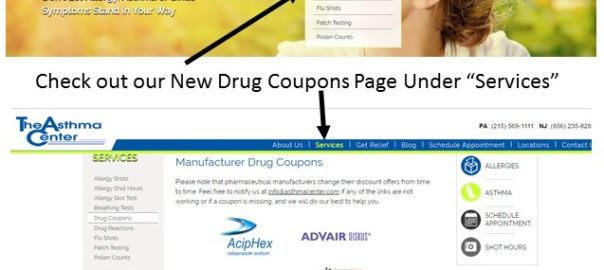
November 1, 2016. A-Z Drug Discounts, Coupons & Savings Programs
Media Inquiries: Please email gwoodlyn@asthmacenter.com
The health information contained in this article is meant for basic informational purposes only. It is not intended to serve as medical advice, substitute for a doctor’s appointment or to be used for diagnosing or treating a disease.
According to a recent article from Kaiser Health News, issues related to drug prices and out-of-pocket costs rank as the top healthcare concern for Americans.
Many pharmaceutical companies offer discounts, coupons, and “savings” programs. However, these offers can be challenging to find, change frequently, and be difficult to manage when multiple medications are part of one’s Allergy and/or Asthma Action Plan.
The Asthma Center board certified Allergists and staff have found a way to help, and we are excited to announce a new feature on our website, our Drug Coupons page!
• Drug Coupons: “A-Z, Ways to Save”
The Asthma Center Allergists and staff have worked to compile a comprehensive list of links to discount offers, coupons, and savings programs for more than 35 of the most commonly recommended allergy and asthma medications including, Advair, Dymista, EpiPen, Symbicort and more. We will continue to expand our list, which currently includes both prescription and over-the-counter (OTC) medications.
• Drug Coupons: “A Resource You Can Count On”
At The Asthma Center, taking care of you is our top priority. With our Drug Coupons page, The Asthma Center brings you all the links you need, in one place, to save money on the medications which are crucial elements of your Allergy and Asthma Action Plan.
Just as you count on The Asthma Center Allergists and staff to provide the best allergy, asthma, immunology & sinus care, you can count on current, accurate, web links to all of the latest offers. Feel free to notify us at info@asthmacenter.com if you find any of the links are out of date or if a coupon is missing.
Flu Season has started
Now, and over the coming months, is the time to get your flu shot.
Flu Shots are recommended for everyone 6 months and older and are available at The Asthma Center because flu shots are one of the most important steps you can take to prevent getting the “flu.”
Don’t wait! Schedule your “quadrivalent” flu shot today in one of our 9 Locations throughout the Delaware Valley including Pennsylvania (Center City Philadelphia, Society Hill Philadelphia, Northeast Philadelphia, Bala Cynwyd, and Langhorne) and Southern New Jersey (Mount Laurel, Woodbury, Hamilton, and Forked River.)
Make an appointment to see an allergist – Why Choose Us?
The best way to fight your allergies & asthma is to visit a board certified allergist, learn what your allergies are, create a treatment plan, and adjust as needed. No two allergy & asthma sufferers are alike, so don’t rely on over the counter medications when you could be targeting your symptoms with the help of our allergy experts! At The Asthma Center, our goal is to personalize your treatment to help you find relief. One way we accomplish this is by identifying your allergies and specific levels of allergic sensitivity through allergy skin testing to help you plan your treatment. By following the local pollen counts, we are able to customize allergy regimens that prevent symptoms caused by taking too little or too much allergy medication.
More Info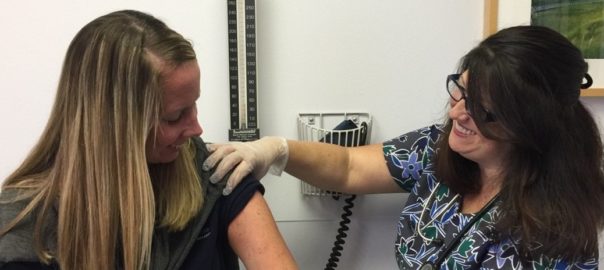
September 22, 2016. Buyer Beware: Flu Shots? Get the Best
The Asthma Center physicians and staff get flu shots too! In the above picture taken 09/22/2016 in The Asthma Center’s Woodbury, NJ office (courtesy staffer Shannon Cephas, LPN), Clinical Supervisor Sandy Richards, RN administers the quadrivalent flu shot to Medical Secretary Michelle Wood!
For interviews regarding flu shots and/or tours of the Delaware Valley’s only certified pollen and mold spore stations for the National Allergy Bureau (NAB), please email gwoodlyn@asthmacenter.com
The health information contained in this article is meant for basic informational purposes only. It is not intended to serve as medical advice, substitute for a doctor’s appointment or to be used for diagnosing or treating a disease.
Flu Season has started—Now, and over the coming months, is the time to get your flu shot.
Flu Shots are recommended for everyone 6 months and older and are available at The Asthma Center because flu shots are one of the most important steps you can take to prevent getting the “flu.”
⋅ Four is Better Than Three
The Asthma Center physicians highly recommend the new quadrivalent (4 strain) influenza vaccine. This is the vaccine administered by our practice because it provides the most complete protection against the “flu” this winter. The quadrivalent vaccine contains the four most common types of the influenza virus versus only three types in the older trivalent (3 strain) vaccine.
⋅ Buyer Beware
Many local pharmacies and other medical facilities have continued to administer the inferior (less expensive) trivalent influenza vaccine when a patient asks for a “flu shot”. So, be sure to ask for the quadrivalent formulation.
⋅ New & Vital Info for Parents
Children are a particularly vulnerable group when it comes to the “flu,” and every parent needs to know:
For the 2016-2017 flu season, the Centers for Disease Control and Protection (CDC) only recommend injectable flu shots!
The CDC is not recommending the FDA approved nasal spray vaccine (FluMist) this year because of concerns about how well it works.
What if my child is afraid of needles?
The Asthma Center physicians and staff have years of experience in providing the best care including vaccines, allergy shots, and allergy skin testing to children of all ages (and adults.) We know that no two individuals are alike, and we take pride in tailoring and providing personalized care in a safe, comfortable, and compassionate environment.
⋅ Customized Experience & Care
At The Asthma Center, we personalize your experience by choosing the form of the influenza vaccine that is right for you – multiple doses for young children, preservative-free for those with preservative sensitivities, high-dose for those over 65 years of age and the quadrivalent vaccine for those not requiring alternative formulations. And, most importantly, we are there for you in the unlikely event you experience an adverse reaction to the vaccine.
Did you know that you should wait for 30 minutes after administration of any vaccine so that if an immediate severe reaction (anaphylaxis) occurs, you can be immediately treated?
What if you have a reaction to the flu shot?
It might seem convenient, but have you ever wondered what would happen if you had a reaction to a vaccine in a facility where a physician is not available? Who is there to counsel and treat you?
At The Asthma Center, all of our locations are well equipped to handle reactions. All of The Asthma Center physicians and staff are trained to recognize and treat reactions to vaccine. Taking care of you is our top priority.
⋅ The Asthma Center Flu Shots are Available for Everyone
The Asthma Center makes flu shots available for everyone aged 6 months and older (not just current patients.)
Call now to schedule your appointment for a flu shot now!
⋅ Convenient Locations with Saturday Hours
Don’t wait! Schedule your “quadrivalent” flu shot today in one of our 9 locations!!
You can schedule your appointment during our regular office hours, or on some selected Saturdays!
Call the office nearest you today to schedule your appointment.
Make an appointment to see an allergist – Why Choose Us?
The best way to fight your allergies & asthma is to visit a board certified allergist, learn what your allergies are, create a treatment plan, and adjust as needed. No two allergy & asthma sufferers are alike, so don’t rely on over-the-counter medications when you could be targeting your symptoms with the help of our allergy experts! At The Asthma Center, our goal is to personalize your treatment to help you find relief. One way we accomplish this is by identifying your allergies and specific levels of allergic sensitivity through allergy skin testing to help you plan your treatment. By following the local pollen counts, we are able to customize allergy regimens that prevent symptoms caused by taking too little or too much allergy medication.
Did You Know – Pollen & Mold Spore Counts Direct to Your Inbox!
The Asthma Center’s daily Pollen and Mold Spore Count, the Delaware Valley’s only Official count station which is certified by the National Allergy Bureau are now available via email. Subscribe to receive our daily counts by email or check out some of our other blog posts to learn more about what is in the air, how it can affect you, and what you can do about it.
More Info
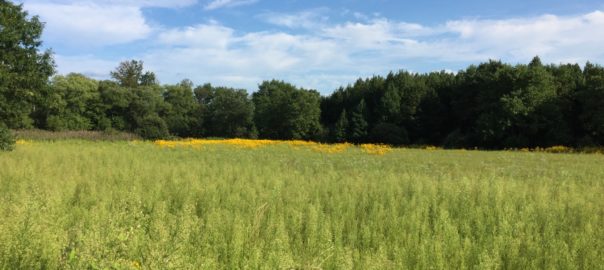
September 7, 2016. Extreme Bloom Burst: Radiant Ragweed Invasion
For interviews and tours of the Delaware Valley’s only certified pollen and mold spore stations for the National Allergy Bureau (NAB) with stations, please email gwoodlyn@asthmacenter.com
The health information contained in this article is meant for basic informational purposes only. It is not intended to serve as medical advice, substitute for a doctor’s appointment or to be used for diagnosing or treating a disease.
Today’s pollen and outdoor mold count from The Asthma Center, the Delaware Valley’s only official count station certified by the National Allergy Bureau (NAB):
Tree pollen is very low.
Grass pollen is moderate.
Ragweed pollen is extreme.
Other Weed pollen is high.
Outdoor Mold Spores are very high.
Predominant: Ragweed Pollen
#LocalPollenCount Details from Dr. Dvorin
As expected, Ragweed pollen is flooding our air. This photo taken by Dr. Dvorin shows a cluster of ragweed pollen. Note the classic “spikes” which distinguish ragweed pollen from other pollen.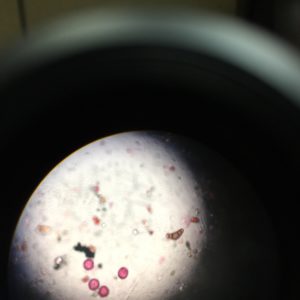
Other weed pollen present include Sage, Sheep Sorrel/Dock, Nettle, and Ornamental weeds.
“Let’s not forget about the fall grass pollen season,” reminds Dr. Dvorin.
In the 1990s, Dr. Dvorin and his partners discovered that our region experiences both the typical spring grass pollen season, and a second grass pollen season in the fall. This discovery was included in the only published work to define pollen and mold spore seasons for the Delaware Valley. [Dvorin DJ, Lee JJ, Goldstein MF, et al. A Comparative, Volumetric Survey of Airborne Pollen in Philadelphia, Pennsylvania (1991-1997) and Cherry Hill, New Jersey (1995-1997). Ann Allergy Asthma Immunol 2001; 87:394-404]
Outdoor Mold Spore levels decreased by an estimated one-half over the last 24 hours, which according to Dr. Dvorin may be related to drier, cooler conditions overnight. For those with allergy to outdoor molds, however, today’s very high levels may continue to provoke moderate to severe symptoms.
#WednesdayWisdom from Dr. Dvorin
“Ragweed blooms are clearly in full swing here in the Delaware Valley,” says Dr. Dvorin. “And if you have allergies and/or asthma, you should definitely be maximizing your personal Allergy Action Plan!”
For example, your individual Allergy Action Plan may include the use of eye drops, nasal drops, antihistamines and/or nasal rinses 30 minutes to one hour prior to going outdoors. This example is for general informational purposes only and is not intended to serve as medical advice or substitute for a doctor’s appointment.
Reminder for Current Patients of The Asthma Center: If you have not reviewed your Allergy Action Plan with one of our board certified allergists in the last three months, schedule your appointment now.
Sneezing, Coughing, or Wheezing right now?
To find out if you are allergic to ragweed, call now to schedule Allergy Skin Testing, which is one of the most reliable methods to determine allergy sensitivity, particularly when correlated with your personal history.
To accommodate the schedules of both our current and new patients, The Asthma Center is offering Saturday appointments throughout September and October in our Mount Laurel, NJ, Hamilton, NJ, Langhorne, PA, and Northeast Philadelphia locations.
Be sure to Subscribe to receive The Asthma Center daily pollen counts direct to your inbox.
Grass Pollen: Does the smell of cut grass bother you?
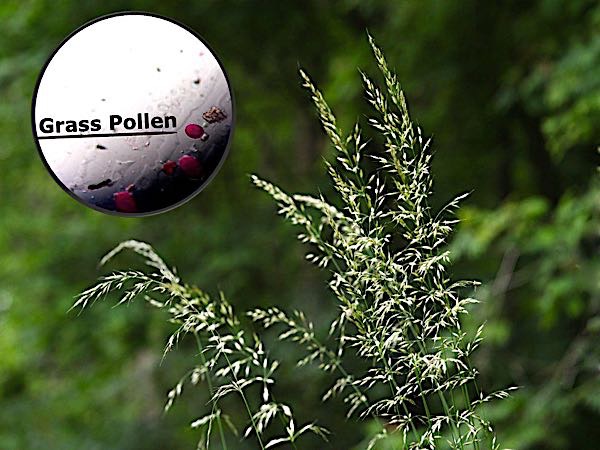
Mowing your lawn regularly can help cut down on the pollination of grasses on your property. However, many people experience allergy symptoms when exposed to the smell of freshly cut grass. Allergic reactions to mowed grass are more likely from the non-pollen parts of the grass containing allergenic proteins or molds being stirred up in the mowing process. When you mow your lawn, allergen concentration of this type will dramatically increase for a short period of time during and immediately after you mow. So, mowing your lawn will often be beneficial in the long-term, though it may aggravate your allergies short-term. Reactions to cut grass sometimes can go beyond the Spring grass pollination season as well. Again, this is not due to grass pollen but from exposure to mold spores or reactions to other grass antigens in the blades of grass.
Tips to Reduce Pollen Exposure
- Wear long sleeves and long pants when mowing the grass. Be sure to shower & wash your hair afterwards.
- Limit time outdoors during the early morning hours when the most pollen is released.
- Sleep with windows closed and drive with windows up.
- Beware of tracking pollen into your home (kids, pets especially, newspaper sleeves, and on shorts and jackets).
- Shower and wash your hair after extended outdoor exposure.
- Wear sunglasses or glasses outdoors to limit exposure of pollen to your eyes.
- Avoid wearing contact lenses, or switch to daily disposable contacts to avoid allergens building up on the lenses.
- Wash your hands and face frequently, including eyebrows.
- Change your pillowcase often.
Make an appointment to see an allergist – Why Choose Us?
The best way to fight your allergies & asthma is to visit a board certified allergist, learn what your allergies are, create a treatment plan, and adjust as needed. No two allergy & asthma sufferers are alike, so don’t rely on over the counter medications when you could be targeting your symptoms with the help of our allergy experts! At The Asthma Center, our goal is to personalize your treatment to help you find relief. One way we accomplish this is by identifying your allergies and specific levels of allergic sensitivity through allergy skin testing to help you plan your treatment. By following the local pollen counts, we are able to customize allergy regimens that prevent symptoms caused by taking too little or too much allergy medication.
Did You Know – Pollen & Mold Spore Counts Direct to Your Inbox!
The Asthma Center’s daily Pollen and Mold Spore Count, the Delaware Valley’s only Official count station which is certified by the National Allergy Bureau are now available via email. Subscribe to receive our daily counts by email or check out some of our other blog posts to learn more about what is in the air, how it can affect you, and what you can do about it.
More Info
August 18, 2016. Ragweed Pollen Surge for Philly & Southern NJ
The health information contained in this article is meant for basic informational purposes only. It is not intended to serve as medical advice, substitute for a doctor’s appointment or to be used for diagnosing or treating a disease.
For interviews and tours of the Delaware Valley’s only certified pollen and mold spore stations for the National Allergy Bureau (NAB) with stations, please email gwoodlyn@asthmacenter.com
“Ragweed surged,” Dr. Dvorin states simply.
“It was textbook weather conditions really,” he goes on to explain “with a thunderstorm over night Tuesday into Wednesday followed by a day of hot, dry, windy weather—and the result is a lot more ragweed pollen in the air. “
Today’s photo, taken by Dr. Dvorin, shows a ragweed pollen grain from today’s air sample. Note the classic “spikes” which distinguish this troublesome pollen.
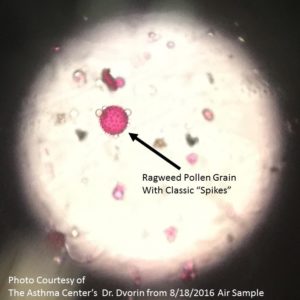
Today’s pollen and outdoor mold count from The Asthma Center, the Delaware Valley’s only official count station certified by the National Allergy Bureau (NAB) is:
Tree pollen is very low.
Grass pollen is very low.
Ragweed pollen is moderate.
Other Weed pollen is low.
Outdoor Mold Spore* levels are extreme.
*Aspergillus-Penicillium molds are strikingly high again today. For more on this unusual outdoor mold level and what it means, read Dr. Dvorin’s blog from June 21, 2016 Tales from the Microscope: Unusual Mold Alert
Predominant: Ragweed & Outdoor Mold Spores Outdoor mold spore levels have been elevated and are expected to remain elevated consistent with heat, humidity and rainfall in our area.
It’s not too late to get Ragweed Ready— The Asthma Center specialists recommend three key steps now!
Based on Dr. Dvorin’s historical data, ragweed pollen can be expected to flood the air in the Delaware Valley in the next few weeks. The Asthma Center specialist recommend taking three key steps now to keep from suffering (and sneezing) through the fall allergy season (steps are detailed in our recent blog: Ragweed Readiness: The Three Keys)
#Ragweed #FastFact

Ragweed pollen has been found 400 miles out to sea (Asthma & Allergy Foundation of America.)
While it is true that ragweed is very light and easily dispersed by winds, The Asthma Center specialists do not recommend cancelling vacations or avoiding trips down the shore based on the above #fastfact.
Typically, less ragweed pollen seems to be found around large bodies of water, so the seashore is a likely area for relief for pollen sufferers.
Ragweed does blanket most of the United States with the sparing only the southernmost tip of Florida, Northern Maine, and the northern West Coast. Traveling or vacationing to these or other areas with minimal ragweed plants may also bring relief.
Be sure to download Allergies & Asthma Travel Tips 101 for tips on reducing your exposure to ragweed pollen while on vacation.
Make an appointment to see an allergist – Why Choose Us?
The best way to fight your allergies & asthma is to visit a board certified allergist, learn what your allergies are, create a treatment plan, and adjust as needed. No two allergy & asthma sufferers are alike, so don’t rely on over the counter medications when you could be targeting your symptoms with the help of our allergy experts! At The Asthma Center, our goal is to personalize your treatment to help you find relief. One way we accomplish this by identifying your allergies and specific levels of allergic sensitivity through allergy skin testing to help you plan your treatment. By following the local pollen counts, we are able to customize allergy regimens that prevent symptoms caused by taking too little, or too much allergy medication.
Did You Know – Pollen & Mold Spore Counts Direct to Your Inbox!
The Asthma Center’s daily Pollen and Mold Spore Count, the Delaware Valley’s only Official count station which is certified by the National Allergy Bureau are now available via email. Subscribe to receive our daily counts by email or check out some of our other blog posts to learn more about what is in the air, how it can affect you, and what you can do about it.
More Info
August 17, 2016. Amish Dust Protects Against Allergies & Asthma
For interviews and tours of the Delaware Valley’s only certified pollen and mold spore stations for the National Allergy Bureau (NAB) with stations, please email gwoodlyn@asthmacenter.com
The health information contained in this article is meant for basic informational purposes only. It is not intended to serve as medical advice, substitute for a doctor’s appointment or to be used for diagnosing or treating a disease.
New Study
A new study published in the New England Journal of Medicine looked at the risk of asthma and allergies in two different agricultural communities in the United States: 1) the Amish who use traditional farming technology and 2) the Hutterite who use industrialized farming technology.

The Amish community are known to have fewer allergies & asthma than the Hutterite community with the latter group having rates comparable to rates seen in the general U.S. population.
Although these two communities are similar in genetic ancestry and lifestyle, the study results showed the incidence of asthma and allergies in Amish children was 4 – 6 times lower than in the Hutterite children. Associated with this finding were higher levels of endotoxin in the dust samples from Amish homes as well as results of blood samples and experiments in mice that have shown lower rates of allergic sensitization. Endotoxin is a substance found in the outer membrane of certain bacteria that can provoke strong immune responses.
This study suggests that the Amish homestead and traditional farming methods may provide “protection” due to increased bacteria exposure children experience when reared in a farm-based environment with close proximity to farm animals and their barns. This consequently may lead to advantages in their native immune system that leads to “protection” against developing allergies and asthma. Even though this new study was with a small number of children, the results showed significant differences in the prevalence of asthma, the immune profiles of the two communities, and a significant role in the differences in rates of allergic sensitization.
Putting farm animals near or in people’s homes is an impractical protective measure. However, this study provides valuable insight and perhaps increasing exposure to helpful bacteria such as using an aerosolized “dust spray” for home environments may become a future option for preventing allergies and asthma.
Make an appointment to see an allergist – Why Choose Us?
The best way to fight your allergies & asthma is to visit a board certified allergist, learn what your allergies are, create a treatment plan, and adjust as needed. No two allergy & asthma sufferers are alike, so don’t rely on over the counter medications when you could be targeting your symptoms with the help of our allergy experts! At The Asthma Center, our goal is to personalize your treatment to help you find relief. One way we accomplish this is by identifying your allergies and specific levels of allergic sensitivity through allergy skin testing to help you plan your treatment. By following the local pollen counts, we are able to customize allergy regimens that prevent symptoms caused by taking too little, or too much allergy medication.
Did You Know – Pollen & Mold Spore Counts Direct to Your Inbox!
The Asthma Center’s daily Pollen and Mold Spore Count, the Delaware Valley’s only Official count station which is certified by the National Allergy Bureau are now available via email. Subscribe to receive our daily counts by email or check out some of our other blog posts to learn more about what is in the air, how it can affect you, and what you can do about it.
More Info
August 16, 2016. Ragweed Rising: Three Keys of Readiness
For interviews and tours of the Delaware Valley’s only certified pollen and mold spore stations for the National Allergy Bureau (NAB) with stations, please email gwoodlyn@asthmacenter.com
The health information contained in this article is meant for basic informational purposes only. It is not intended to serve as medical advice, substitute for a doctor’s appointment or to be used for diagnosing or treating a disease.
“Ragweed pollen tripled in the last 24 hours,” says Dr. Dvorin. “It has definitely arrived. I took this picture of a ragweed in bloom on my walk last evening.”
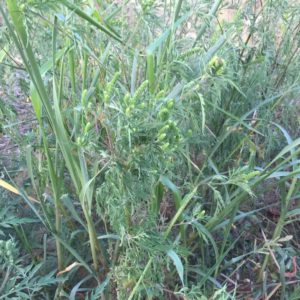
Today’s pollen and outdoor mold count from The Asthma Center, the Delaware Valley’s only official count station certified by the National Allergy Bureau (NAB) is:
Tree pollen is very low.
Grass pollen is low.
Ragweed pollen is moderate.
Other Weed pollen is moderate.
Outdoor Mold Spore levels are very high
Predominant: Ragweed Pollen & Outdoor Mold Spores
Ragweed Readiness: The Three Keys
Based on Dr. Dvorin’s historical data, ragweed pollen can be expected to flood the air in the Delaware Valley in the next few weeks.
The Asthma Center specialists recommend taking three key steps now to keep from suffering (and sneezing) through the fall allergy season.
1. Implement your personal Allergy Action Plan now.
This is one of the most important things you can do to be sure that you take your allergy and asthma medications before your symptoms start (including the use of intranasal corticosteroid sprays)
For current patients of The Asthma Center, if you have not reviewed your Allergy Action Plan with one of our board certified allergists in the last three months, schedule your appointment now.
2. Know your level of ragweed pollen sensitivity and monitor ragweed pollen levels.
To find out if you are allergic to ragweed, call now to schedule Allergy Skin Testing, which is one of the most reliable methods to determine allergy sensitivity, particularly when correlated with your personal history.
Be sure to Subscribe to receive The Asthma Center daily pollen counts direct to your inbox.
Check back in to read The Asthma Center’s latest blog posts to learn more about ragweed, how it can affect you, and what you can do about it.
3. Reduce your exposure to ragweed pollen
Wear long sleeves and long pants when mowing the grass.
Sleep with windows closed and drive with windows up.
Beware of tracking grass pollen into your home (kids, pets especially, newspaper sleeves, and on shorts and jackets).
Shower and wash your hair after extended outdoor exposure.
Wear sunglasses or glasses outdoors to limit exposure of pollen to your eyes.
Avoid wearing contact lenses, or switch to daily disposable contacts to avoid allergens building up on the lenses.
Wash your hands and face frequently, including eyebrows.
Change your pillowcase often.
Be sure to download Allergies & Asthma Travel Tips 101 for tips on reducing your exposure to ragweed pollen while on vacation.
Ragweed 411
Ragweed pollen is considered the biggest trigger of fall allergy and asthma symptoms because of its “numbers”:
the number of people with ragweed pollen allergy:
The American College of Allergy, Asthma & Immunology estimated in 2011 that one in 10 Americans have ragweed allergy.
the number of ragweed plants:
There are 17 varieties of ragweed. Ragweed blankets most of the U.S. sparing only the southernmost tip of Florida, Northern Maine, and the northern West Coast.
the number of ragweed pollen grains in the air:
It is estimated that a single ragweed plant can produce up to 1 billion grains of pollen.
Make an appointment to see an allergist – Why Choose Us?
The best way to fight your allergies & asthma is to visit a board certified allergist, learn what your allergies are, create a treatment plan, and adjust as needed. No two allergy & asthma sufferers are alike, so don’t rely on over the counter medications when you could be targeting your symptoms with the help of our allergy experts! At The Asthma Center, our goal is to personalize your treatment to help you find relief. One way we accomplish this is by identifying your allergies and specific levels of allergic sensitivity through allergy skin testing to help you plan your treatment. By following the local pollen counts, we are able to customize allergy regimens that prevent symptoms caused by taking too little, or too much allergy medication.
Did You Know – Pollen & Mold Spore Counts Direct to Your Inbox!
The Asthma Center’s daily Pollen and Mold Spore Count, the Delaware Valley’s only Official count station which is certified by the National Allergy Bureau are now available via email. Subscribe to receive our daily counts by email or check out some of our other blog posts to learn more about what is in the air, how it can affect you, and what you can do about it.
More Info
August 12, 2016. Sports Asthma and the Olympics
For interviews and tours of the Delaware Valley’s only certified pollen and mold spore stations for the National Allergy Bureau (NAB) with stations, please email gwoodlyn@asthmacenter.com
The health information contained in this article is meant for basic informational purposes only. It is not intended to serve as medical advice, substitute for a doctor’s appointment or to be used for diagnosing or treating a disease.
The physicians, nurses, and staff at The Asthma Center salute the elite athletes participating in the 2016 Summer Olympics!
We are proud of Team USA ( 39 Medals so far ) !!
The first week of the 2016 Summer Games has certainly confirmed that Olympic athletes epitomize the “best of the best” of both physical fitness and talent. Given the fierce competitions and achievements exhibited, it is no wonder that Olympians seem “superhuman.”
There is one way that Olympians are just like everyone else: Olympic athletes have the same risk (8%) of developing asthma as the general population. Mount Holly, NJ native, Olympic swimmer Kelsi Worrell is one example. She was profiled by USA Today earlier this year regarding her asthma and training for the Rio Olympics.
For Olympic athletes, the rate of asthma has increased in recent decades and asthma is now the most common chronic condition according to a study published this month in the Journal of Clinical Allergy and Immunology. Rates of sports asthma [exercise induced asthma (EIA) also known as exercise induced bronchospasm (EIB) and bronchial hyperresponsiveness (BHR) ] have increased particularly for athletes who compete in any of the endurance sports like swimming, cycling, rowing, and long-distance running. This recent study found that “…asthma develops in endurance athletes and is believed to be related to daily training sessions and frequent competitions with heavily increased ventilation.” Interestingly, the study also found that in Olympic games since 2000, asthmatic athletes won substantially more medals than athletes without asthma and quoted speculation that “…the harder an athlete trains, the better the performance, simultaneously increasing asthma risk.”
Source: J Allergy Clin Immunol 2016:138:409-10
Sports Asthma Action Plan
Few of us are born Olympians, but physical activity is important for everyone, even if you have asthma and/or sports asthma alone. First, it is helpful to know the causes of sports asthma and to be able to recognize the symptoms. Dry air is a common trigger because most individuals breathe through their mouth during exercise. Exposure to pollen and mold as well as other outdoor irritants such as air pollution can provoke symptoms. Indoor allergen exposure as well as exposure to irritants such as chlorine (during swimming in indoor pools) may also provoke sports asthma.
Sports asthma symptoms may vary greatly from person to person. However, coughing, wheezing, shortness of breath, and/or chest tightness with exercise are the typical symptoms which may indicate sports asthma is present, even if there is no other history of asthma. Individuals may also experience similar symptoms with laughing and/or crying. At The Asthma Center, we have established Pulmonary Function Laboratories in all of our 9 office locations to help diagnose and manage your specific breathing condition.
When sports asthma is identified, our specialists create a personalized sports asthma action plan (pre exercise treatment, maintenance treatment, warm-up or cool-down exercises, conditioning, and quick-relief medications) and through regular follow up care, make adjustments as needed. With a plan tailored uniquely for his/her asthma, most individuals can not only can find a sport that can be tolerated but may excel in the physical activity or he/she chooses to enjoy. When asthma symptoms flare, individuals may need to refrain from exercise, contact their specialist, and once symptoms resolve, resume exercise.
Sports Asthma and Kids
 Physical activity is especially important for children with asthma. Summer sports may be winding down, but school is just around the corner.
Physical activity is especially important for children with asthma. Summer sports may be winding down, but school is just around the corner.
Having a sports asthma action plan is the first priority. If your child’s sports asthma action plan has not been reviewed in the last three months, schedule an appointment now as part of your back to school preparations. Next, make sure there is clear communication of the sports asthma action plan between children, parents, coaches, teachers, and school nurses. This will avoid potential misunderstandings and/or delay in treatment. Understanding and communicating the sports action plan is crucial in managing sports asthma for kids and may include pre exercise treatment, maintenance treatment, warm-up or cool-down exercises, conditioning, and access to quick-relief medications. Finally, if your child’s sports asthma does not seem to be under control, or if your child is not doing well after exercise, schedule an appointment with your specialist and review the situation with your child’s teacher(s) and coach(es).
To all the 2016 Olympic Athletes, the physicians, nurses, and staff at The Asthma Center wish you the best of luck as the 2016 Summer Games continue!
To athletes of all ages and abilities with asthma, the physicians, nurses, and staff of The Asthma Center salute you, and we remind you to follow your personalized sports asthma action plan!
Schedule an Appointment – Why Choose Us?
The best way to fight your allergies & asthma is to visit a board certified allergist, learn what your allergies are, create a treatment plan, and adjust as needed. No two allergy & asthma sufferers are alike, so don’t rely on over the counter medications when you could be targeting your symptoms with the help of our allergy experts! At The Asthma Center, we know that no two individuals are alike, and our goal is to personalize your treatment to help you find relief. One way we accomplish this is by identifying your allergies and specific levels of allergic sensitivity through allergy skin testing to help you plan your treatment. By following the local pollen counts, we are able to customize allergy and/or asthma regimens that prevent symptoms caused by taking too little, or too much allergy and/or asthma medication.
Did You Know – Pollen & Mold Spore Counts Direct to Your Inbox!
The Asthma Center’s daily Pollen and Mold Spore Count, the Delaware Valley’s only Official count station which is certified by the National Allergy Bureau are now available via email. Subscribe to receive our daily counts by email or check out some of our other blog posts to learn more about what is in the air, how it can affect you, and what you can do about it.
More Info
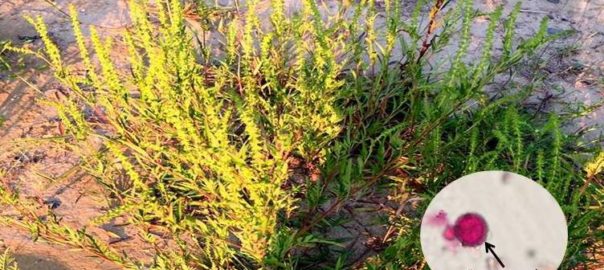
August 10, 2016. First Ragweed Pollen of the 2016 Season Sighted
“Ragweed is here early with our first ragweed pollen observed in the air samples, “ announced Dr. Dvorin.
The ragweed pollen pictured here was photographed by Dr. Dvorin while viewing today’s air sample by microscope.
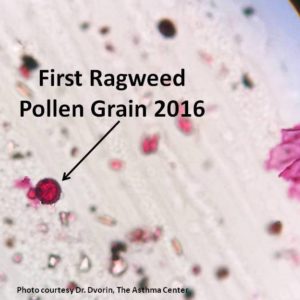
Today’s Count
Tree pollen is very low.
Grass pollen is not seen.
Ragweed pollen is very low.
Other Weed pollen is moderate.
Outdoor Mold Spore levels are extreme.
Predominant: Outdoor Mold Spores
Outdoor mold spore levels have been elevated and are expected to remain elevated consistent with heat, humidity and rainfall in our area.
Get Ready for Ragweed Pollen Season Now
Ragweed is a major source for allergy and asthma symptoms, so be sure to take your allergy and asthma medications before symptoms start.
Review your Allergy Action Plan with one of The Asthma Center specialists including the use of intranasal corticosteroid sprays.
Monitor pollen and mold counts. Subscribe to receive The Asthma Center daily counts direct to your inbox.
Check back in to read The Asthma Center’s latest blog posts to learn more about ragweed, how it can affect you, and what you can do about it.
Make an appointment to see an allergist – Why Choose Us?
The best way to fight your allergies & asthma is to visit a board certified allergist, learn what your allergies are, create a treatment plan, and adjust as needed. No two allergy & asthma sufferers are alike, so don’t rely on over the counter medications when you could be targeting your symptoms with the help of our allergy experts! At The Asthma Center, we know that no two individuals are alike, and our goal is to personalize your treatment to help you find relief. One way we accomplish this through identifying your allergies and specific levels of allergic sensitivity through allergy skin testing to help you plan your treatment. By following the local pollen counts, we are able to customize allergy regimens that prevent symptoms caused by taking too little, or too much allergy medication.
Did You Know – Pollen & Mold Spore Counts Direct to Your Inbox!
The Asthma Center’s daily Pollen and Mold Spore Count, the Delaware Valley’s only Official count station which is certified by the National Allergy Bureau are now available via email. Subscribe to receive our daily counts by email or check out some of our other blog posts to learn more about what is in the air, how it can affect you, and what you can do about it.
More Info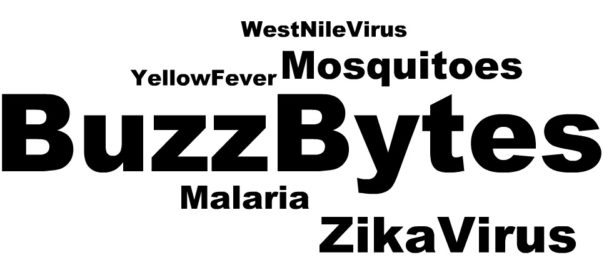
August 4, 2016. Mosquito Buzz Bytes: Do This, Not That
For interviews and tours of the Delaware Valley’s only certified pollen and mold spore stations for the National Allergy Bureau (NAB) with stations, please email gwoodlyn@asthmacenter.com
At least 15 cases of locally transmitted cases of Zika virus have been identified in Southern Florida!
Use these tips from our physicians to help avoid mosquitoes and the Zika virus threat.
“Zika infection” is a looming threat as summer fun, heat & humidity kick into high gear. Now, more than ever, it is vital to protect your family against “pesky” mosquito bites in general.
In the Q&A session we are sharing here, The Asthma Center specialists have gathered and analyzed latest information on Zika infection, mosquitoes, and mosquito bites (prevention, repellents, and how to relieve the “itch.”) Also included for your convenience is a compilation of resource links to help you stay informed and protected.
Don’t let mosquitoes (or the fear of Zika infection) ruin the fun of an August cookout, child’s soccer game or family outing—Read The Asthma Center Mosquito Buzz Bytes to make sure you are up-to-date on all things mosquitoes!
Click here for PDF version to save and use all summer and year long
Which mosquitoes bite?
Female mosquitoes bite.
When do mosquitoes bite?
Mosquitoes look for human hosts most commonly during the early evening hours which correspond with the time of day during the summer when people are most active outdoors: barbecuing, watching sporting events, gardening, camping, or exercising.
Reminder: While early evening hours present the most common threat, mosquitoes can bite at any time. We are susceptible to mosquito bites at all hours, day and night, and during the summer months, prevention should be considered for all outdoor activities!
Why do mosquitoes bite humans?
They need human blood as nutrition for their eggs. A syringe like apparatus on a mosquito’s head draws blood upon a bite.
Why do mosquito bites itch so much?
The itch is an immune response to mosquito saliva. Before drawing blood, the mosquito first injects her saliva, which causes an immune response, resulting in histamine rushing to the site of the bite, causing a red, itchy welt.
What relieves the itch?
Ice can combat the itch when applied to the bite area.
Another good way to reduce swelling and itching is to apply hydrocortisone, calamine or anti-histamine cream.
When these medications don’t relieve the itch, discuss a personal mosquito bite action plan with an allergist. Many individuals are not aware that allergy shots are helpful in most cases for those who have had an extreme allergic reaction to a mosquito bite!
Are mosquito bites dangerous?
Besides the uncomfortable local reaction, mosquito bites can become infected and/or can spread serious viral illnesses, including West Nile virus and Zika virus, which are the current threats from mosquito bites in the United States. If you are traveling outside the U.S., the current threats include malaria, yellow fever, dengue fever, chikungunya, and Japanese encephalitis.
How can one be protected from a bite? What works? What does not work?
Smart clothing choices are essential.
- Long sleeves and pants, tucked into socks. Light colored clothing. Loose fitted clothing.
Smart protective sprays have been shown effective for repelling mosquitoes.
Repellents containing the following ingredients are ideal:
- DEET– (10-30%)
- Concentrations with greater than 50% DEET have been not shown to be more effective than concentrations of 30% DEET
- Brands include Ben’s® Tick and Insect Repellents, OFF!, and Cutter

- Oil of lemon eucalyptus (must be synthetic)
- Look for “p-methanediol” on ingredient list
- Brand Repel
- Picardin
- Brand Sawyer
- IR3535
Permethrin -treated clothing (such as the No Fly Zone line from L.L.Bean) is also a good option.
- DIY option: treat clothing with permethrin before Be sure to apply repellent to exposed skin.
Travel with a bed net for protection while sleeping outdoors. Treat bed netting with permethrin. There are also nets to cover food available.

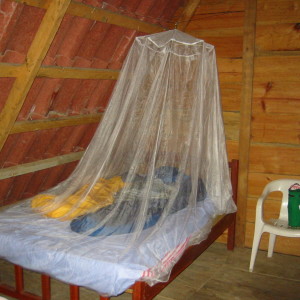
“Natural” Repellents such as citronella, peppermint, and geranium oil have not been shown to be very successful.
Why do some people get more bites than other people?
One research study demonstrated mosquitoes had no preference between identifical twins but the same was not true for fraternal twins. Therefore, genetics play a role in whether or not mosquitoes prefer one human over another.
Human breath attracts mosquitoes due to exhaled carbon dioxide well as other chemicals. Other chemicals (such as perfumes and colognes), body heat, and some bacteria on the skin also attract mosquitoes.
Mosquitoes are especially attracted to larger people, including pregnant women, as they exhale more carbon dioxide.
Backyard mosquitoes? Here’s how to control them.
- Mosquitoes multiply in standing water. Be sure to remove all sources of standing water including on top of pool covers, bird baths, logs, tires, and flower pots.
Repellent devices? Do they even work?
- Studies have shown zapper and ultrasonic devices do very little to keep mosquitoes away. Clip on and wrist repellents are not as effective as they were once believed to be.
The Asthma Center physicians and staff hope you have a healthy, fun August and that you and your family enjoy many outdoor activities! It may not be possible to avoid all mosquito bites. However, The Asthma Center is committed to keeping you informed about current threats of infection and the latest in treatment and prevention. Check back here, Subscribe to receive our latest blogs and pollen counts direct to your inbox, or follow us on Twitter, FB, and Instagram.
More Resources:
Zika Virus
- CDC
- CDC protect yourself infographic
- Philadelphia Department of Public Health
- NJ Department of Health
More on Mosquitoes
- American Academy of Allergy, Asthma & Immunology
- Berkley Wellness, University of California
- American Academy of Allergy, Asthma & Immunology
Make an appointment to see an allergist – Why Choose Us?
The best way to fight your allergies & asthma is to visit a board certified allergist, learn what your allergies are, create a treatment plan, and adjust as needed. No two allergy & asthma sufferers are alike, so don’t rely on over the counter medications when you could be targeting your symptoms with the help of our allergy experts! At The Asthma Center, we know that no two individuals are alike, and our goal is to personalize your treatment to help you find relief. One way we accomplish this through identifying your allergies and specific levels of allergic sensitivity through allergy skin testing to help you plan your treatment. By following the local pollen counts, we are able to customize allergy regimens that prevent symptoms caused by taking too little, or too much allergy medication.
Did You Know – Pollen & Mold Spore Counts Direct to Your Inbox!
The Asthma Center’s daily Pollen and Mold Spore Count, the Delaware Valley’s only Official count station which is certified by the National Allergy Bureau are now available via email. Subscribe to receive our daily counts by email or check out some of our other blog posts to learn more about what is in the air, how it can affect you, and what you can do about it.
More Info



